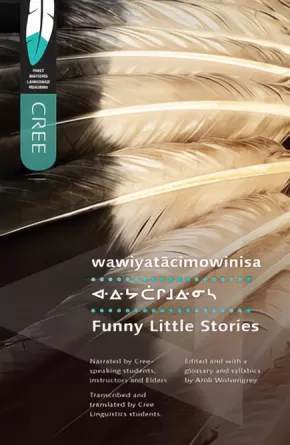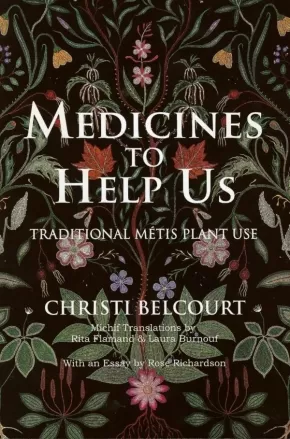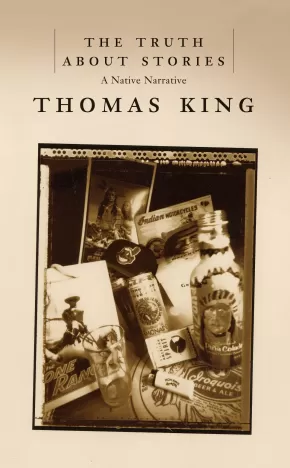
Indigenous Languages
76
-
78
of
78 Results;
Sort By
Go To
of 6
Funny Little Stories / wawiyatacimowinisa (1 in stock, in reprint)
$12.95
Editors:
Format:
Paperback
Text Content Territories:
Indigenous Canadian; First Nations; Cree (Nehiyawak); Plains Cree; Swampy Cree ; Woodland Cree;
ISBN / Barcode: 9780889771857
Synopsis:
Synopsis:
This is the first in a series of readers in the First Nations languages of the prairie provinces meant for language learners and language users. The stories in this volume come from a variety of sources, all being narrated or written by fluent speakers of Cree, whether students or instructors of the Cree language or Elders. Funny Little Stories is a collection of nine stories representing the Plains Cree, Woods Cree, and Swampy Cree dialects, with a pronunciation guide and a Cree-to-English glossary.
Students and Elders come together in this volume to offer samples of three distinct genres of Cree storytelling: word play, humorous accounts of life experiences, and traditional stories about Wisahkecahk, the trickster-hero.
Each story is illustrated and is presented in both Standard Roman Orthography and syllabics, with English translation.
Educator & Series Information
Funny Little Stories is part of the First Nations Language Readers series. With a mix of traditional and new stories, each First Nations Language Reader introduces an Indigenous language and demonstrates how each language is used today. The University of Regina Press’s long-term goal is to publish all 60+ Indigenous languages of Canada.
Additional Information
110 pages | 5.50" x 8.50" | Narrated by Cree-speaking students, instructors, and Elders | Transcribed and Translated by Cree Linguistics Students | Edited and with a glossary and syllabics by Arok Wolvengrey
Authenticity Note: Because of the contribution of Indigenous Peoples, such as Cree-speaking Elders, to this work on Cree storytelling, it has received the Authentic Indigenous Text label.
Medicines to Help Us: Traditional Métis Plant Use
$25.00
Artists:
Text Content Territories:
Indigenous Canadian; Métis;
ISBN / Barcode: 9780920915790B
Synopsis:
Synopsis:
Based on Métis artist Christi Belcourt’s painting “Medicines to Help Us,” this innovative and vibrant resource honours the centuries-old healing traditions of Métis women. With contributions from Métis Elders Rose Richardson and Olive Whitford, as well as key Michif phrases and terminology, Medicines to Help Us is the most accessible resource relating to Métis healing traditions produced to date.
Educator Information
This resource guide does not include the study prints referred to on the back cover and within the book.
Michif Translators: Laura Burnoff and Rita Flamand
Elder Validation: Rose Richardson
Format: Book Only - English, with plant names in Michif, Nehiyawewin (Cree), and Anishinaabemowin (Ojibway)
The Truth About Stories: A Native Narrative
$19.99
Format:
Paperback
Text Content Territories:
Indigenous American; Indigenous Canadian;
ISBN / Barcode: 9780887846960
Synopsis:
Synopsis:
"Stories are wondrous things," award-winning author and scholar Thomas King declares in his 2003 CBC Massey Lectures. "And they are dangerous." In his 2003 Massey lectures, award-winning author and scholar Thomas King looks at the breadth and depth of Native experience and imagination.
Beginning with a traditional Native oral story, King weaves his way through literature and history, religion and politics, popular culture and social protest, gracefully elucidating North America's relationship with its Native peoples.
Native culture has deep ties to storytelling, and yet no other North American culture has been the subject of more erroneous stories. The Indian of fact, as King says, bears little resemblance to the literary Indian, the dying Indian, the construct so powerfully and often destructively projected by White North America. With keen perception and wit, King illustrates that stories are the key to, and only hope for, human understanding. He compels us to listen well.
Reviews
"Trust a novelist and English professor to get to the heart of how stories and storytelling shape our perceptions. This is a wonderful study of the power of words." — Booklist
"A collection of thought-provoking essays examining the importance of the oral tradition. Storyteller Thomas King addresses Native cultural concerns and their primal link to storytelling. Intriguing and entertaining. Highly recommended for all tribal college collections and literature classes."— Tribal College Journal
"What is revealed in this graceful, even seductive book of essays about storytelling by the esteemed Cherokee novelist, radio personality, university professor, and Canadian émigré is that what is as important as the stories we tell about the world are the ways in which we interpret those stories." — World Literature in Review
"King’s addresses artfully combine literary and cultural criticism, traditional Native American stories, and personal experience." — The Bloomsbury Review
Educator Information
Essay series that is a study of First Peoples' storytelling in North America.
Grades 10-12 English First Peoples Resource for various units.
Curriculum Connections: English, Indigenous Studies, Civics and Careers, History, Humanities and Social Sciences.
Additional Information
208 pages | 5.08" x 8.00"
Sort By
Go To
of 6









